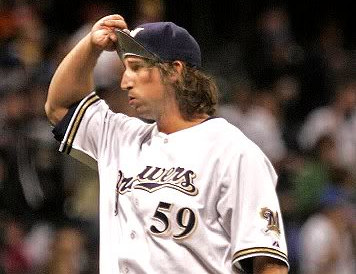Six Tips for Avoiding a Counterfeit Free Agent

Even to this day, experts are uncertain about Derrick Turnbow’s authenticity.
The offseason is an exciting time for general managers. It represents an opportunity to prune a roster which has perhaps become untidy and/or acquire new talent in hopes of winning that next (or first!) championship.
With baseball’s winter meetings nearly upon us, the marketplace for free-agent talent is likely to reach frenzied heights. And while it’s sure to facilitate optimism among all parties involved, it also creates opportunities for fraudulent activity.
Yes, I’m talking about counterfeit major leaguers.
Certain sports management “agencies” or “firms” may sell low-quality players with the Major League label on them, but that does not always mean these players are authentic. Whether you’re purchasing a player to become a staff ace or just serve as a competent utility infielder, there are several ways to tell whether these agencies are selling the real thing or a rip-off.
Here are six tips for GMs ahead of the winter meetings:
1. Build from Within
To be 100% positive you’re not purchasing a fake, you’re best served merely by developing talent from within your own system. Of course, this isn’t always an option for an already good club looking to fill specific roles; still, it’s sound as an overall strategy.
2. Don’t Sign Players off the Street
If just a random person on the street asks you to sign his “authentic” free agent at a steep discount, that’s a red flag. Besides every deal that ever involved Derrick Turnbow, very few deals for actual Major Leaguers are conducted in this fashion.
3. Ask Andrew Friedman
He probably won’t give you the answer because you work for another club, but Andrew Friedman probably has a pretty strong idea about how good is the player you’re about to sign. Maybe buy him three or seven drinks and see if he’ll provide a drunken clue.
4. Avoid “Package” Deals
If an agency offers to package their so-called Major Leaguer with other items to “sweeten” the deal, so to speak — like a matching belt or several matching belts — it’s unlikely that what they have is authentic. Phillies GM Ruben Amaro, in particular, has been deceived multiple times in this fashion.
5. Consider Using Information
Some GMs are deceived by the degree to which a player either looks or sounds or acts like a Major Leaguer, even if he really isn’t one. One way to guard against appearances is to examine his performances over the past, say, three years. If he’s a field player, how well has he hit relative to other players with the same defensive skills? Is he likely to regress (either up or down) from that offensive performance? If he’s a pitcher, how well has he struck batters out while not walking them? Do medical doctors think he’s mostly healthy? They’re simple questions with important answers.
6. Make Sure It’s Not Yuniesky Betancourt
Before finalizing any agreement with a free agent, ask yourself: “Is this player Yuniesky Betancourt?” If the answer is “Yes,” then re-consider the deal you’re making.
Carson Cistulli has published a book of aphorisms called Spirited Ejaculations of a New Enthusiast.
7. Make sure it’s not Yuniesky Betancourt
The fact that there are only six tips when seven are promised suggests that Yuniesky might have been involved in the work. Caveat Emptor!
Indeed, I can’t confirm that Yuniesky Betancourt didn’t edit the post before I published it.